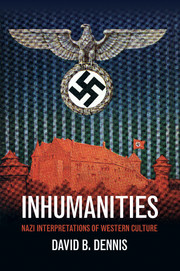Book contents
- Frontmatter
- Contents
- List of Illustrations
- Acknowledgments
- Introduction
- Part I Foundations of Nazi Cultural History
- Part II Blind to the Light
- Part III Modern Dilemmas
- Part IV “Holy” War and Weimar “Crisis”
- 13 Heralds of the Front Experience
- 14 Weimar Culture Wars 1
- 15 Weimar Culture Wars 2
- Part V Nazi “Solutions”
- Notes
- Index
15 - Weimar Culture Wars 2
Combating “Degeneracy”
Published online by Cambridge University Press: 05 October 2012
- Frontmatter
- Contents
- List of Illustrations
- Acknowledgments
- Introduction
- Part I Foundations of Nazi Cultural History
- Part II Blind to the Light
- Part III Modern Dilemmas
- Part IV “Holy” War and Weimar “Crisis”
- 13 Heralds of the Front Experience
- 14 Weimar Culture Wars 1
- 15 Weimar Culture Wars 2
- Part V Nazi “Solutions”
- Notes
- Index
Summary
In rising to its vociferous “defense of Bayreuth,” the Völkischer Beobachter strongly communicated Nazi enmity toward Weimar culture and politics via critiques of what it saw as the Republic’s inability to fully understand or properly honor the greats of German tradition. But in its role as a “combat paper” in the culture wars between modernists and antimodernists that raged in Germany in 1918, it also devoted plenty of space and energy to directly attacking leading figures of “Weimar culture.” As Alan Steinweis articulated:
although artistic modernism had made important inroads in Germany before 1918, it was during the Weimar Republic that it emerged in its full force in literature, painting and sculpture, architecture, music, and theater. Many of the artistic innovations attracted the wrath of cultural conservatives spanning the right side of the political spectrum. They condemned artistic modernism as overly cerebral and international. It did not conform to their notion of authentic “Germanness.”
Creativity derided as “degenerate” was vilified as an antipode to the idealized Kultur that could provide a sense of order to the German present and future.
Primary targets of Nazi aggression were the writers it dismissed as “asphalt literati,” including Stefan Zweig, Max Brod, Maximilian Harden, Alfred Döblin, and Bertoldt Brecht. Zweig (1881–1942) presented an easy target, since he was Jewish and had not served at the front during the First World War. For those who “suffered endlessly in the field,” the paper contended, it was enough to know that Zweig spent the war in Switzerland; this fact alone invalidated any morals offered by “the Jew Zweig” because “the great humanitarian lesson of the World War was that of standing at the sides of German brothers under storms of steel.” The paper also went after “the Prague Jew” Max Brod (1884–1968), not for his involvement with Franz Kafka, but rather for his own novel, Stefan Rott or The Decisive Year (1931), complaining that the book’s publisher had touted it as “a Bildungsroman in the finest style, filled with passion, longing and insight,” and that the Center Party “handed laurels” to the “Jew Brod.” The Völkischer Beobachter countered that the novel was nothing but “a base Jewish gibe at the German race and at German decency,” and wondered why no one had called for its censorship under laws against smut and filth.
- Type
- Chapter
- Information
- InhumanitiesNazi Interpretations of Western Culture, pp. 330 - 358Publisher: Cambridge University PressPrint publication year: 2012

